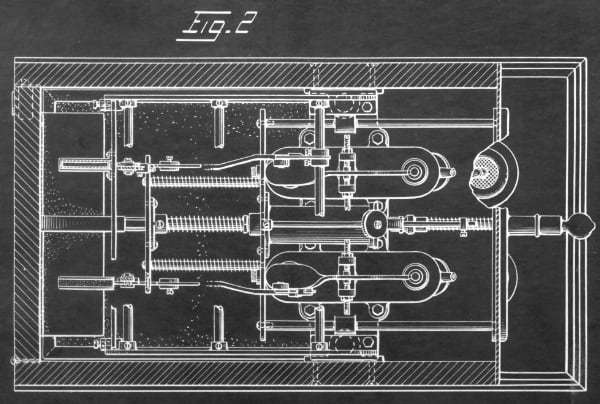<— 4: Maritime Wireless Company 6: Franking Machine between the Wars —>
© 1975 Basil Low (aged 86 at the time )
[box] A good scent is necessary in a successful fox hunt to catch the fox. The promoters of this company aim to provide a good scent to catch the pennies of lovers of perfume and incidentally to fill the pockets of the share holders with dividend. – from the AUTOMATIC PERFUME FOUNTAINS PROSPECTUS[/box]
I left Auckland in July 1921 with my wife Elsie and little son David and arrived in Sydney a few days later to immediately make arrangements to form a £50,000 company to exploit my invention known as The Perfume Fountain. This may sound a bit funny, but the machine was a penny in the slot which delivered 20 drops of perfume on my lady’s handkerchief. You will appreciate its value when I tell you that seven pennies out of eight was profit.
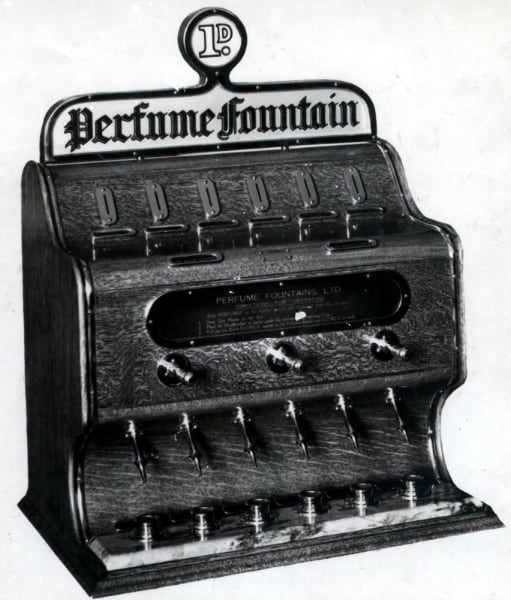
My father, David B Low, was a chemist and druggist and for many years was general manager of Kempthorne Prosser’s New Zealand drug company in Christchurch. I had worked on the business over the years, the principal hurdle being the overcoming of evaporation, perfume being highly volatile. I had perfected this in my spare time while working in the evening while I was working for the company during the day. It was a long process for when I had overcome the evaporation problem I then had to perfect a mechanism to operate the machine upon insertion of the penny. Eventually I was ready to build the first machine.
During this time the Great War was on and I wanted to get some idea as to how the machine would be received by the public. I decided to try out Strange and Company, which is not in business now, but being recognised as on a par with Ballantyne’s (this would be 1915). I managed a sickie from the company and took the bull by the horns and interviewed the general manager, a Mr Smith, who received me very courteously and was impressed with the possibilities. The result of this was that I had to install the machine on a handkerchief counter for 25 working days. The machine being under the supervision of the girls behind the counter, I was thus saved from getting any slugs and this was certainly an advantage.
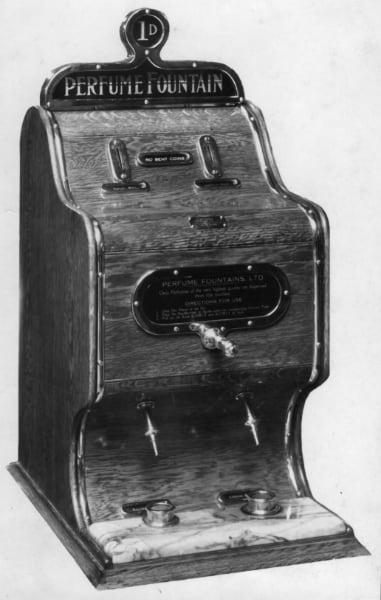
I will never forget the sensation of opening the machine at the end of the trial and finding a proverbial hatful of pennies. The machine was opened in Mr Smith’s office as he having held the key during the trial. Also present was Mr Hedley, the warehouse manager. To say that we were all surprised would be to put it mildly. They wanted me to consider selling the machine to them but I informed them that I would prefer to sell them the New Zealand rights for I had already taken out patents in both New Zealand and Australia. They requested that I see them in a few days to get their verdict. The knowledge that my machine was such a success had me in a whirl for the next few days and only my friend Dave new what was cooking.
I have not decided fully as to what I should accept for the New Zealand rights as it was a family syndicate which comprised of my father, mother, brother, uncle and aunt and self. We had earlier contributed £10 each to cover my expenses for material and time. My people were all in Melbourne by now (supporting my younger brother David who had been offered a job as a cartoonist on the Bulletin) and I was determined, without their sanction, to make a sale. Money was money in those days and I was apprehensive as to what would be their offer.
Well, taking another sickie, I approached the lion’s den and if I have ever shaken internally or externally it was then. To make a long story short they offered £150 cash on the nail. Big hearted Basil refused and said that I would have to cable my father in Melbourne for his approval. My father replied by cable “NO”. During the period of suspense I had formed the opinion that I might try beating up the price for a change and after further consideration I made a further visit and showing my father’s cable I suggested £250 which after some good sales talk on my part they finally accepted. It was arranged through their solicitors that the transfer be completed and I well remember the day I was laughing all way way to the bank.
I had made a success for the syndicate and was able to return their original investment with something over. Shortly after this my father returned from Melbourne and the first thing he mentioned was that, thinking it over, he thought we should have accepted the £150 they offered as it would have covered expenses and been satisfactory to all members of the syndicate. I did not keep him long in suspense and when he learnt what I have done he was delighted beyond words.
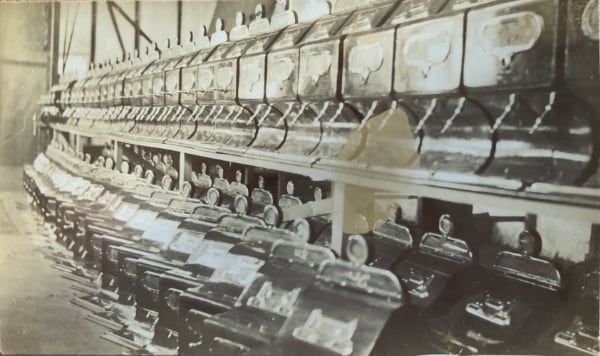
As the war was still on we decided to sit pat until conditions improved for the introduction to Australia. In the meantime I was to construct a special model for this purpose and I was barely started on this when I left for Auckland. In addition to my franking machine activities in Auckland I was able to complete the new model we intended to present to Australia. In the meantime the Christchurch syndicate of Strange and Company, HH Smith and Hedley, had formed their own syndicate and made a proposal to me to build them a further machine using a cabinet which would be made in Strange and Company’s own factory. It would be made of special oak. As they made beautiful furniture I accepted the offer and gave them instructions to make an additional one for me. They certainly made a beautiful job of these which I received in due course.
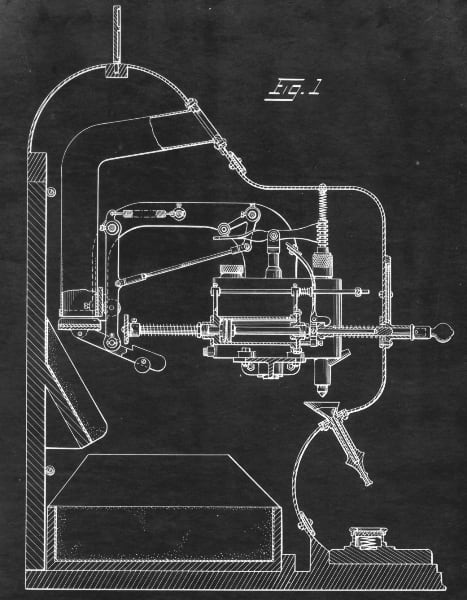 The next move was to complete the necessary mechanism which necessitated my working around the clock for I was going hammer and tongs with my franking machine and typewriter business. I did not mind and my good wife did not object to my coming home at all hours as she knew that I was fighting for a purpose and making good headway. I have my occasional game of snooker and we could manage either concert or the pictures now and then. I am afraid that my church was neglected as I always devoted the whole day to work since there were no interruptions and I was the only person in the building.
The next move was to complete the necessary mechanism which necessitated my working around the clock for I was going hammer and tongs with my franking machine and typewriter business. I did not mind and my good wife did not object to my coming home at all hours as she knew that I was fighting for a purpose and making good headway. I have my occasional game of snooker and we could manage either concert or the pictures now and then. I am afraid that my church was neglected as I always devoted the whole day to work since there were no interruptions and I was the only person in the building.
Mr Moss visited Auckland while I was in full swing and saw my machine which he thought attractive but no more. He knew that I would eventually leave for Australia and I introduced him to my father-in-law who was taking over the franking machine agency when I was good and ready.
The next move came from the Smith and Hedley syndicate who offered me a share and cash if I would try to float a company in Auckland and offer both New Zealand and Australia rights in conjunction. It seemed a good idea and I accepted the proposal. I immediately got in touch with the broker in the building, (Hellaby’s) and after a trial of 25 working days in a soda fountain business another hat full of pennies came to light and we formed a £6000 company in 20 days and fully subscribed. I was appointed managing director at £10 a week and I was to complete the machines I was working on with the prospect of an expense account in the Australian venture.
Things were booming and the mechanics who worked in another room and whom I trusted, suddenly tried their hand at putting one over me. I had a maintenance contract for all the typewriters that would be going to the Union Steamship Company and which covered Fiji Islands and the ship Niagara which was running between Vancouver and Australia. Every time the Niagara called in at Auckland we had to take off the standard machine and the purser’s portable one for cleaning and any adjustments. What happened was this, and let it be a lesson to those in business to know the business. These three blighters brought two machines in the day the Niagara berthed and stripped them down which was customary and, knowing full well that the ship was leaving at 3 o’clock the next afternoon, we had to make sure that both machines had to be back on board before that time otherwise there would be real trouble.
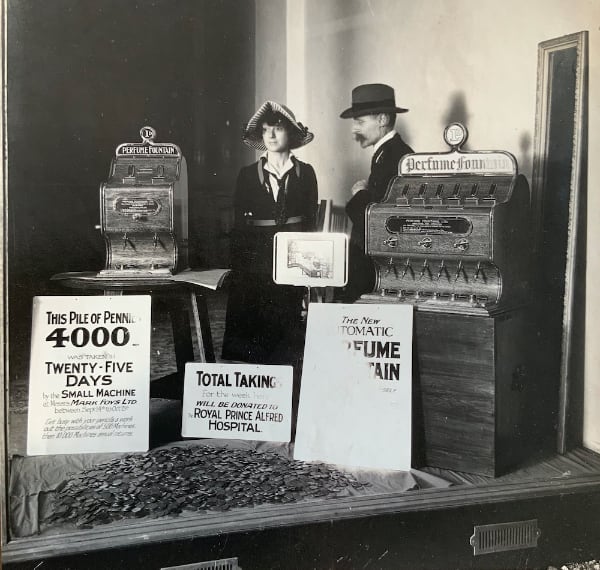
On arrival at my workshop, fortunately before that mechanics were expected to start, what did I find? The parts of both machines scattered all over the bench and some of the parts not even cleaned. At 8 o’clock, the appointed time to start, there was no appearance by the mechanics and by 8.30 still no appearance and I began to realise that my trust had been misplaced and that I was to be crucified and my good name ruined. I certainly could not afford to run such a risk, particularly with The Union Steamship Company who had approximately 40 machines under contract with me and were very valued customers. I will never forget my feelings when I gazed upon such an unholy mess and realised that I had little time to reassemble both machines and get them to the ship on time. There was no alternative but to hop into it myself which I did at breakneck speed. I will never forget this as my feelings were of anger and I was deliberating as to what sort of greeting I would give my noble mechanics if they ever put in an appearance.

To make a long story short, the appearance came next morning and internally at boiling point I handed them what was due to them in wages and sacked all three on the spot. I refused each one a reference and said if they ever showed up near my workshop again there would be another lift well tragedy. It was comparatively easy to find staff replacements at the time and boys for training in the business so I had little difficulty in that score and once again I restored things to normal but kept a watchful eye on the Niagara jobs ever after. Reverting to my effort to have those machines on time, I had both machines ready for testing by 1 o’clock and I was consoled with the fact that I had learned another lesson.
Meanwhile I was proceeding with the construction of the perfume fountains and this was going along smoothly in my own private room where I had my lathe and drilling machine and not forgetting the beautiful sunlight which poured in all day long. I was very happy here for the room was comfortably furnished and I was able to take a respite in a big easy chair with cigars laid on.
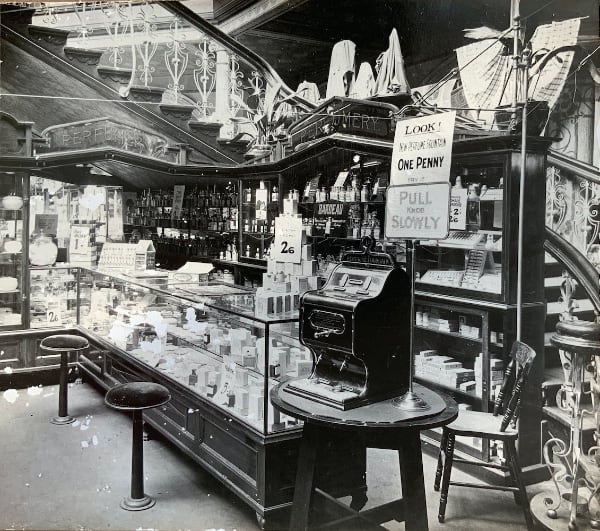
The franking machine and typewriter workshop was on the floor above where I had a girl installed with the mechanics to attend to customers.
All went well in our processing world and I was really in the money so I featured another patent from the hat and again consulted my broker with regard to another floatation. This was a contrivance to fit on a mason jar for beating and mixing eggs, cream and other liquids. We called it the World Beater and it was very effective. I have developed this in Christchurch but kept it secret until I imagined the time to bring it to daylight. To make another story as short as possible, it went off with a bang and the result was another £6000 Company for which as vendor I received £1000 Cash and a parcel of shares. This happened just prior to my leaving Auckland with the Perfume Fountain and what actually happened after I left was never disclosed except that the company went into liquidation, so I was told, due to the inability to have it manufactured. Ah me.
Next, while all this was going on in Auckland, we had successfully formed the Automatic Perfume Fountains in Sydney and I was appointed supervising engineer and the director to the company at a bank manager’s salary. We were to manufacture approximately 100 machines and I had to supervise the making of all the press tools to cope with the job. We turned out 113 machines which were installed in various department stores and other sites which looked likely to be remunerative. We had seven directors, too many for me, for I anticipated there would be friction sooner or later as they were a mixed lot and had different ideas as to how the business should be run.
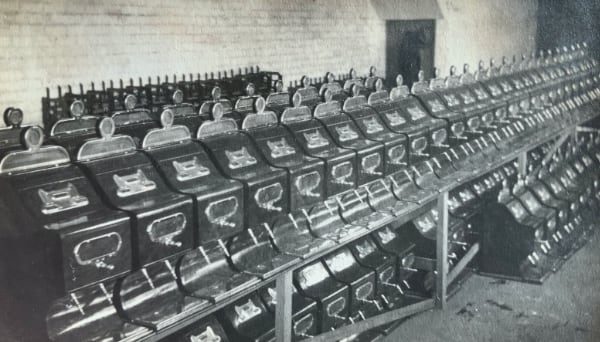
Considering that I had designed the machine for a chemist’s counter where it would be under supervision, I was horrified to learn that they were to be put on railway platforms in the ladies room and for which a rental would have to be paid. After hearing of this, and at the next directors meeting, I objected in no uncertain measure and reminded them that if they persisted with this idea the machines would be without supervision and would have to be enclosed in armour plate to withstand the treatment being dished out to the Nestles chocolate machines. Many of these I have seen completely broken to bits and lying on the platform. The very thought of my machines, with only an oak case for protection, being subjected to such treatment, created such a storm that I tendered my resignation and informed the other directors that they were headed for the rocks and I was definitely not going to be a passenger with them.
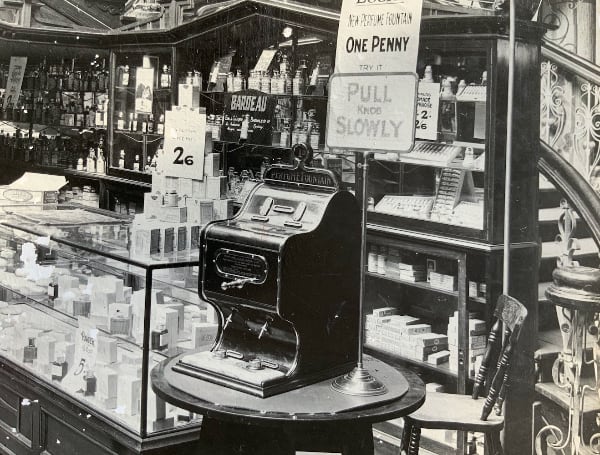
The fountains in certain sites were earning good money but on railway stations they were getting such rough treatment and tons of slugs that it was anything but laughable. I was right, for in about another six months the number of damaged machines had accumulated to such an extent that they were running out of replacements.
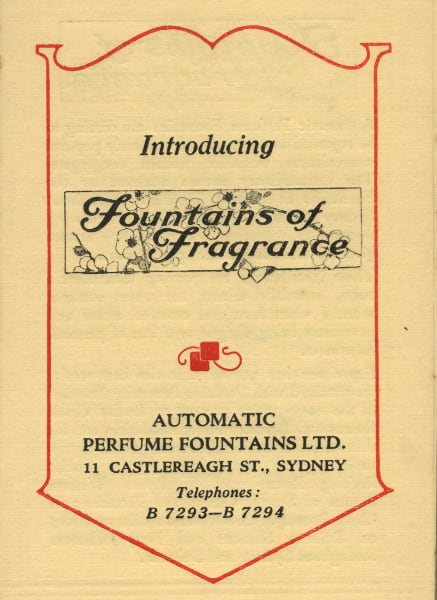
So it went on until finally the company went into liquidation. Immediately this happened, I interviewed the liquidator and arranged to purchase all the machines in profitable sites along with the car specially built to hold six machines.
I lived on the takings from these machines for about 12 months and it was a very comfortable way to live since, should it rain hail or shine, I could stay at home and imagine how many pennies dropping into my machines. There were times when I would be home for days and this gave me the opportunity to work on other ideas for the future. We were living well and I trained my good wife to clear the machines should I be otherwise engaged. This arrangement worked very well until one day I received a long letter from Gilby inquiring whether I would be available to accompany him to Melbourne for the purpose of submitting the New Zealand and English franking machines to the Postmaster General’s department.
4: Maritime Wireless Company 6: Franking Machine between the Wars —>
